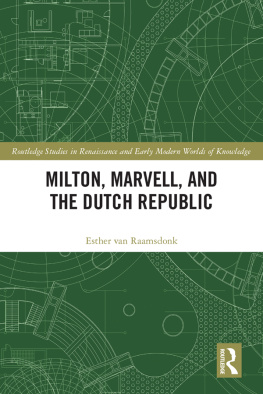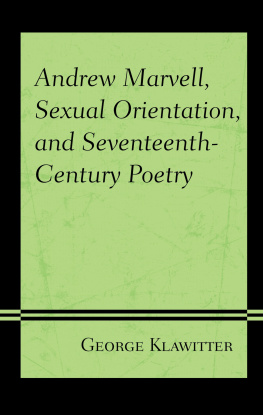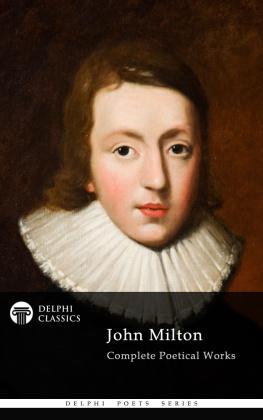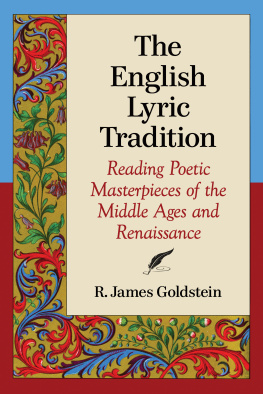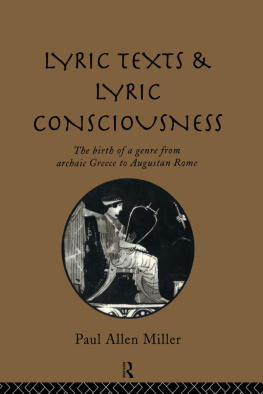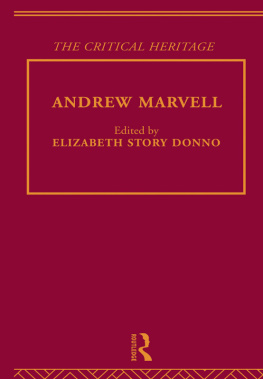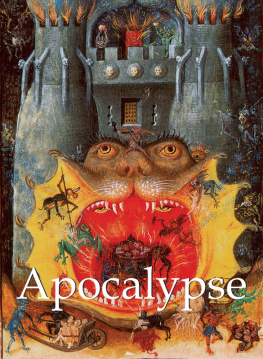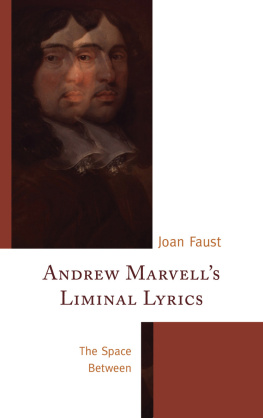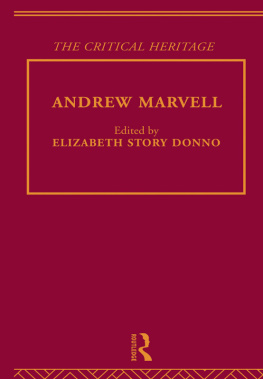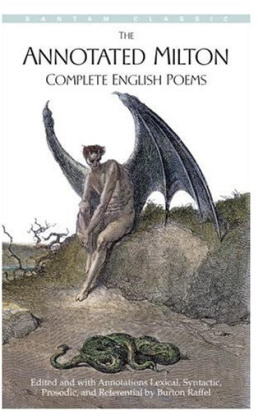Netzley - Lyric apocalypse: Milton, Marvell, and the nature of events
Here you can read online Netzley - Lyric apocalypse: Milton, Marvell, and the nature of events full text of the book (entire story) in english for free. Download pdf and epub, get meaning, cover and reviews about this ebook. publisher: Fordham University Press, genre: Politics. Description of the work, (preface) as well as reviews are available. Best literature library LitArk.com created for fans of good reading and offers a wide selection of genres:
Romance novel
Science fiction
Adventure
Detective
Science
History
Home and family
Prose
Art
Politics
Computer
Non-fiction
Religion
Business
Children
Humor
Choose a favorite category and find really read worthwhile books. Enjoy immersion in the world of imagination, feel the emotions of the characters or learn something new for yourself, make an fascinating discovery.

Lyric apocalypse: Milton, Marvell, and the nature of events: summary, description and annotation
We offer to read an annotation, description, summary or preface (depends on what the author of the book "Lyric apocalypse: Milton, Marvell, and the nature of events" wrote himself). If you haven't found the necessary information about the book — write in the comments, we will try to find it.
Netzley: author's other books
Who wrote Lyric apocalypse: Milton, Marvell, and the nature of events? Find out the surname, the name of the author of the book and a list of all author's works by series.
Lyric apocalypse: Milton, Marvell, and the nature of events — read online for free the complete book (whole text) full work
Below is the text of the book, divided by pages. System saving the place of the last page read, allows you to conveniently read the book "Lyric apocalypse: Milton, Marvell, and the nature of events" online for free, without having to search again every time where you left off. Put a bookmark, and you can go to the page where you finished reading at any time.
Font size:
Interval:
Bookmark:
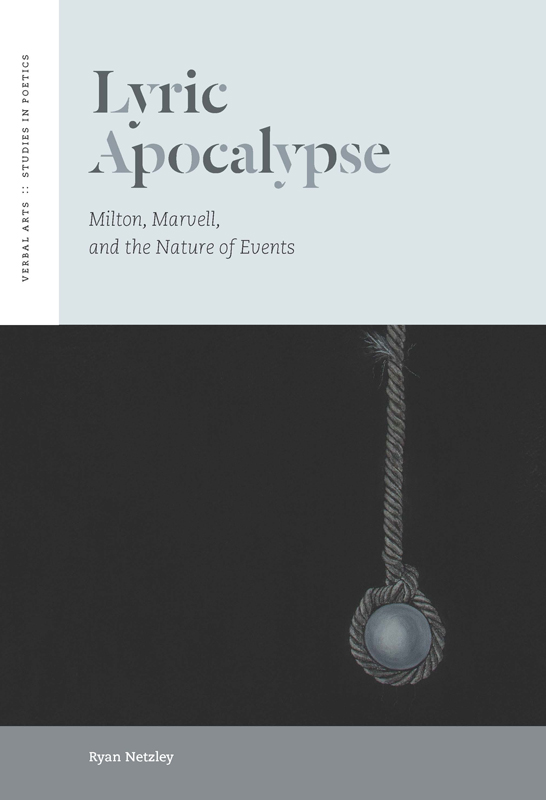
Lyric Apocalypse
VERBAL ARTS :: STUDIES IN POETICS
SERIES EDITORS :: Lazar Fleishman and Haun Saussy
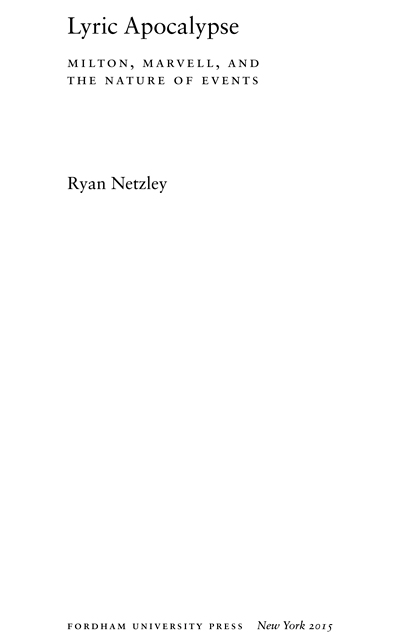
Copyright 2015 Fordham University Press
All rights reserved. No part of this publication may be reproduced, stored in a retrieval system, or transmitted in any form or by any meanselectronic, mechanical, photocopy, recording, or any otherexcept for brief quotations in printed reviews, without the prior permission of the publisher.
Fordham University Press has no responsibility for the persistence or accuracy of URLs for external or third-party Internet websites referred to in this publication and does not guarantee that any content on such websites is, or will remain, accurate or appropriate.
Fordham University Press also publishes its books in a variety of electronic formats. Some content that appears in print may not be available in electronic books.
Visit us online at www.fordhampress.com.
Library of Congress Cataloging-in-Publication Data
Netzley, Ryan, 1972
Lyric apocalypse : Milton, Marvell, and the nature of events / Ryan Netzley.
p. cm. (Verbal arts : studies in poetics)
Summary: How can one experience the apocalypse in the present? Lyric Apocalypse argues that John Miltons and Andrew Marvells lyrics depict revelation as an immediately perceptible event. In so doing, their lyrics explore the nature of events, the modern question of what it means for something to happen in the present Provided by publisher.
Includes bibliographical references and index.
ISBN 978-0-8232-6347-9 (hardback)
1. Milton, John, 16081674Criticism and interpretation. 2. Marvell, Andrew, 16211678Criticism and interpretation. 3. Apocalyptic literatureHistory and criticism. 4. Apocalypse in literature. 5. Revelation in literature. 6. Change in literature. 7. English poetry17th centuryHistory and criticism. I. Title. II. Title: Milton, Marvell, and the nature of events.
PR3592.P64N48 2014
821'.4dc23 | 2014029450 |
Printed in the United States of America
17 16 15 5 4 3 2 1
First edition
CONTENTS
Thomas P. Anderson and Jason Kerr read every single word of this manuscript. I am grateful for their generosity, their patience, and, most of all, their intellectually provocative responses to the argument. Their comments, interest, and insight have made this a more nuanced and interesting book. Daniel Shore and Greg Coln Semenza commented incisively on the sonnets chapter and helped me to improve it substantially. Brendan Prawdzik did the same for the chapter on Upon Appleton House. Finally, Yasuko Taoka gamely responded to a series of questions about New Testament Greek. I owe all of them.
Numerous interlocutors at the following conferences helped to shape this work: The Andrew Marvell Society meetings at the South-Central Renaissance Conferences in 2013 and 2012; the International Milton Symposium in Tokyo in 2012; the British Milton Seminar in 2011; the 2011 Conference on John Milton, sponsored by Middle Tennessee State University; and the Philosophical Collaborations Conference at Southern Illinois University, Carbondale, in 2011. In particular, I would like to thank Nicholas von Maltzahn, Gabriella Gruder-Poni, Nigel Smith, Blaine Greteman, Brendan Prawdzik, Lauren Shohet, Daniel Shore, John Creaser, Thomas Corns, and Don Beith for provocative questions and extremely helpful comments at these venues. I would also like to thank the students in my seminar on lyric and events, especially Brian Cook and Jay Simons, and in my senior seminar on the definition of poetry, especially Rosalind Whitley. They grappled enthusiastically and earnestly with the issues discussed in this book.
At Fordham University Press, Thomas Lay has been an encouraging and enthusiastic champion of this project. I also thank the two manuscript readers, whose comments helped me to improve and clarify the argument and offered some pivotal objections. I am very grateful for the meticulous care that they brought to the task of reviewing the project.
During the course of this books composition, Alison Erazmus was always game to celebrate moments of provisional triumph. It is dedicated to her not only because she suffered through many, many harangues about the end of days, but also because of her indefatigable willingness to imagine not only a better future, but also a more intense and a more beautiful present.
Lyric Apocalypse
What happens now? in modern parlance often means What happens next? This is not so much an error as it is a recognition of the centrality of a conception of the future, even an apocalyptic one, for any notion of the present. We are accustomed to the notion that the present is always fleeting into the past or yearning for a better tomorrow, a nodal point defined via negation and ungraspable as such. This intuitive, geometric model of temporality is precisely what Milton and Marvell seek to unseat with their lyric presentations of an immanent apocalypse. To treat an eschatological revelation as a live, hopeful possibilityinstead of as a restful end to pain or struggle or an ultimate vengeance on ones enemiesrequires more than empty wishfulness or even a commitment to revolutions promise of a purified return to the past and the overturning of existing structures. The lyric, with its penchant for immediacy, enables precisely this attempt, insisting that a real event occurs within a poem and that this event is not reducible to the mere archaeology of hermeneutics or the daydreaming of fancy.
Milton and Marvell attempt nothing less than to present change, concrete, substantive transformation, as an affirmative possibility in the present, not something we merely recognize after the fact or confidently explain away as having been there all along. As a result, teleology, typology, dialectic, and chance disruption all fail as viable understandings of events. Teleology and typology treat occasions as nodes in a cloaked providential design, ultimately uncovered belatedly by a wise and penetrating reader. Although the dialectic describes the motor of change as an auto-generated difference instead of a transcendent narrative, it too insists that events have always already happened, that the new is merely an actualization of what was already the case, in potentia. Chance singularity, finally, turns events into little more than a fetishistic, self-deluding surprise: We pretend not to know what we already know, that the event is really coming. So we are left with neither a world-weary exasperation that everything has already been written nor an idle faux navet that awaits the ludic, liberating arrival of the other. These poets use lyric forms, particularly pastoral and its country-house variant, Petrarchan and occasional sonnets, and encomia, to reconceive the nature of events, what it means for something to happen. For Milton and Marvell, ultimately, novelty and change are more than political or even epistemological concepts, represented in verse but occurring elsewhere. These poets turn to lyric because it allows them to conceive the new as operating immanently in the present. Lyric, in this sense, is not just the safe containment of events inside an aesthetic object, the representational narrative or dramatic doubling of the worlds more important turning points. In Marvells and Miltons hands, at least, it is a genre that insists on the immediate temporality of its own poetic, formal, and aesthetic eventsthat poems, their reading, and the changes within them are happening right now.
Font size:
Interval:
Bookmark:
Similar books «Lyric apocalypse: Milton, Marvell, and the nature of events»
Look at similar books to Lyric apocalypse: Milton, Marvell, and the nature of events. We have selected literature similar in name and meaning in the hope of providing readers with more options to find new, interesting, not yet read works.
Discussion, reviews of the book Lyric apocalypse: Milton, Marvell, and the nature of events and just readers' own opinions. Leave your comments, write what you think about the work, its meaning or the main characters. Specify what exactly you liked and what you didn't like, and why you think so.


